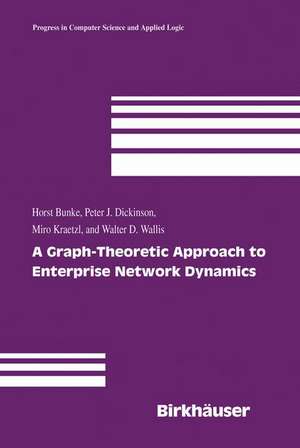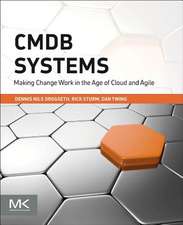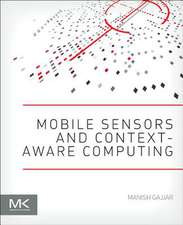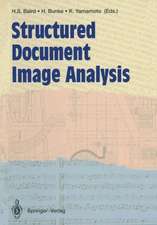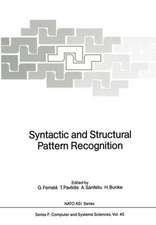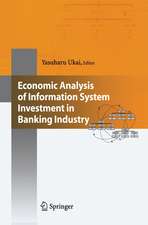A Graph-Theoretic Approach to Enterprise Network Dynamics: Progress in Computer Science and Applied Logic, cartea 24
Autor Horst Bunke, Peter J. Dickinson, Miro Kraetzl, Walter D. Wallisen Limba Engleză Hardback – dec 2006
Based on many years of applied research of generic network dynamics, this work covers a number of elegant applications (including many new and experimental results) of traditional graph theory algorithms and techniques to computationally tractable network dynamics analysis to motivate network analysts, practitioners and researchers alike. The material is also suitable for graduate courses addressing state-of-the-art applications of graph theory in analysis of dynamic communication networks, dynamic databasing, and knowledge management.
Din seria Progress in Computer Science and Applied Logic
- 20%
 Preț: 342.78 lei
Preț: 342.78 lei -
 Preț: 380.25 lei
Preț: 380.25 lei - 20%
 Preț: 333.54 lei
Preț: 333.54 lei - 20%
 Preț: 1020.33 lei
Preț: 1020.33 lei - 15%
 Preț: 591.29 lei
Preț: 591.29 lei - 20%
 Preț: 340.49 lei
Preț: 340.49 lei - 20%
 Preț: 611.81 lei
Preț: 611.81 lei - 20%
 Preț: 334.71 lei
Preț: 334.71 lei - 20%
 Preț: 655.85 lei
Preț: 655.85 lei -
 Preț: 387.75 lei
Preț: 387.75 lei - 15%
 Preț: 588.04 lei
Preț: 588.04 lei - 20%
 Preț: 586.71 lei
Preț: 586.71 lei - 20%
 Preț: 474.87 lei
Preț: 474.87 lei -
 Preț: 410.88 lei
Preț: 410.88 lei -
 Preț: 393.74 lei
Preț: 393.74 lei -
 Preț: 403.75 lei
Preț: 403.75 lei - 15%
 Preț: 646.75 lei
Preț: 646.75 lei - 15%
 Preț: 646.43 lei
Preț: 646.43 lei - 20%
 Preț: 339.66 lei
Preț: 339.66 lei - 15%
 Preț: 698.94 lei
Preț: 698.94 lei - 15%
 Preț: 653.79 lei
Preț: 653.79 lei - 18%
 Preț: 730.79 lei
Preț: 730.79 lei -
 Preț: 399.29 lei
Preț: 399.29 lei - 20%
 Preț: 420.91 lei
Preț: 420.91 lei - 20%
 Preț: 335.03 lei
Preț: 335.03 lei -
 Preț: 379.86 lei
Preț: 379.86 lei -
 Preț: 381.00 lei
Preț: 381.00 lei - 20%
 Preț: 334.86 lei
Preț: 334.86 lei
Preț: 646.80 lei
Preț vechi: 808.50 lei
-20% Nou
Puncte Express: 970
Preț estimativ în valută:
123.78€ • 134.41$ • 103.98£
123.78€ • 134.41$ • 103.98£
Carte tipărită la comandă
Livrare economică 22 aprilie-06 mai
Preluare comenzi: 021 569.72.76
Specificații
ISBN-13: 9780817644857
ISBN-10: 0817644857
Pagini: 225
Ilustrații: XIV, 226 p. 110 illus.
Dimensiuni: 155 x 235 x 17 mm
Greutate: 0.45 kg
Ediția:2007
Editura: Birkhäuser Boston
Colecția Birkhäuser
Seria Progress in Computer Science and Applied Logic
Locul publicării:Boston, MA, United States
ISBN-10: 0817644857
Pagini: 225
Ilustrații: XIV, 226 p. 110 illus.
Dimensiuni: 155 x 235 x 17 mm
Greutate: 0.45 kg
Ediția:2007
Editura: Birkhäuser Boston
Colecția Birkhäuser
Seria Progress in Computer Science and Applied Logic
Locul publicării:Boston, MA, United States
Public țintă
Academic/professional/technical: Research and professionalCuprins
Intranets and Network Management.- Graph-Theoretic Concepts.- Event Detection Using Graph Distance.- Matching Graphs with Unique Node Labels.- Graph Similarity Measures for Abnormal Change Detection.- Median Graphs for Abnormal Change Detection.- Graph Clustering for Abnormal Change Detection.- Graph Distance Measures based on Intragraph Clustering and Cluster Distance.- Matching Sequences of Graphs.- Properties of the Underlying Graphs.- Distances, Clustering, and Small Worlds.- Tournament Scoring.- Prediction and Advanced Distance Measures.- Recovery of Missing Information in Graph Sequences.- Matching Hierarchical Graphs.
Recenzii
From the reviews:
"This book introduces various graph theory topics, and shows how these concepts can be used to solve some of the real problems that arise in these five functional areas. … It is more suitable for research professors working with data networks, graduate students in the subject, or advanced undergrads in discrete mathematics." (G. M. White, Computing Reviews, Vol. 50 (1), January, 2009)
"This monograph focusses on the dynamic nature of networks. It provides guidance in answering questions concerning the detection and identification of faults … . Most mathematicians will appreciate the applications … and at the same time find numerous open problems in mathematics suggested by the needs of dynamic network modelling. … The monograph should prove interesting not only to network managers, but also to mathematicians in a variety of fields. … it provides a good starting point for the underlying mathematics." (Charles J. Colbourn, Zentralblatt MATH, Vol. 1157, 2009)
"This book introduces various graph theory topics, and shows how these concepts can be used to solve some of the real problems that arise in these five functional areas. … It is more suitable for research professors working with data networks, graduate students in the subject, or advanced undergrads in discrete mathematics." (G. M. White, Computing Reviews, Vol. 50 (1), January, 2009)
"This monograph focusses on the dynamic nature of networks. It provides guidance in answering questions concerning the detection and identification of faults … . Most mathematicians will appreciate the applications … and at the same time find numerous open problems in mathematics suggested by the needs of dynamic network modelling. … The monograph should prove interesting not only to network managers, but also to mathematicians in a variety of fields. … it provides a good starting point for the underlying mathematics." (Charles J. Colbourn, Zentralblatt MATH, Vol. 1157, 2009)
Textul de pe ultima copertă
Networks have become nearly ubiquitous and increasingly complex, and their support of modern enterprise environments has become fundamental. Accordingly, robust network management techniques are essential to ensure optimal performance of these networks. This monograph treats the application of numerous graph-theoretic algorithms to a comprehensive analysis of dynamic enterprise networks. Network dynamics analysis yields valuable information about network performance, efficiency, fault prediction, cost optimization, indicators and warnings.
The exposition is organized into four relatively independent parts: an introduction and overview of typical enterprise networks and the graph theoretical prerequisites for all algorithms introduced later; an in-depth treatise of usage of various graph distances for event detection; a detailed exploration of properties of underlying graphs with modeling applications; and a theoretical and applied treatment of network behavior inferencing and forecasting using sequences of graphs.
Based on many years of applied research on generic network dynamics, this work covers a number of elegant applications (including many new and experimental results) of traditional graph theory algorithms and techniques to computationally tractable network dynamics analysis to motivate network analysts, practitioners and researchers alike. The material is also suitable for graduate courses addressing state-of-the-art applications of graph theory in analysis of dynamic communication networks, dynamic databasing, and knowledge management.
The exposition is organized into four relatively independent parts: an introduction and overview of typical enterprise networks and the graph theoretical prerequisites for all algorithms introduced later; an in-depth treatise of usage of various graph distances for event detection; a detailed exploration of properties of underlying graphs with modeling applications; and a theoretical and applied treatment of network behavior inferencing and forecasting using sequences of graphs.
Based on many years of applied research on generic network dynamics, this work covers a number of elegant applications (including many new and experimental results) of traditional graph theory algorithms and techniques to computationally tractable network dynamics analysis to motivate network analysts, practitioners and researchers alike. The material is also suitable for graduate courses addressing state-of-the-art applications of graph theory in analysis of dynamic communication networks, dynamic databasing, and knowledge management.
Caracteristici
Treats the application of numerous graph-theoretic algorithms to a comprehensive analysis of dynamic enterprise networks Covers a number of elegant applications, including many new and experimental results, to motivate network analysts, practitioners and researchers alike Also suitable for graduate courses addressing state-of-the-art applications of graph theory in analysis of dynamic communication networks and dynamic databasing
